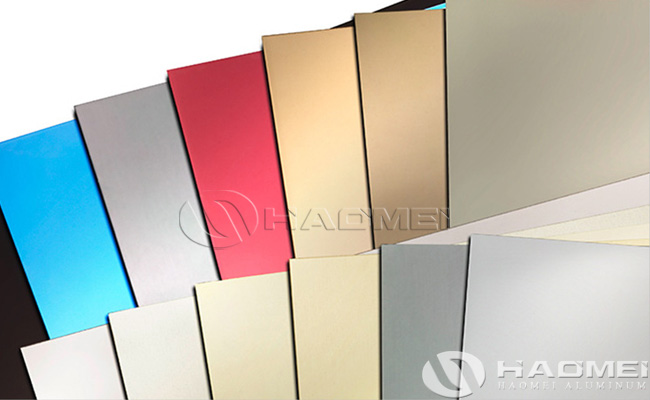6061 anodized aluminum sheet is an anodized aluminum alloy material with excellent comprehensive properties and is widely used in industry, construction, aerospace and other fields.

- Chemical composition and material properties
6061 aluminum alloy belongs to Al-Mg-Si alloy, the main alloying elements are magnesium (Mg) and silicon (Si), and its typical chemical composition is as follows:
– Silicon (Si): 0.40-0.8%
– Magnesium (Mg): 0.8-1.2%
– Copper (Cu): 0.15-0.40%
– Iron (Fe): ≤0.7%
– Manganese (Mn): 0.15%
– Chromium (Cr): 0.04-0.35%
– Zinc (Zn): 0.25%
– Titanium (Ti): 0.15%
– Aluminum (Al): Balance
The alloy is artificially aged by forming Mg₂Si strengthening phase, and has medium strength, good corrosion resistance, weldability and excellent anodizing effect.
- Mechanical properties
The mechanical properties of 6061 aluminum alloy vary depending on the heat treatment state. Common data are as follows:
– Tensile strength (σb): 180-205 MPa (T6 state can reach higher values)
– Yield strength (σ0.2): ≥110 MPa
– Elongation (δ5): ≥14%
– Brinell hardness (HB): 95-100
After anodizing, the hardness of the surface oxide film is significantly improved (up to 250-500 HV), and the wear resistance and corrosion resistance are further enhanced.
- Production process and oxide film characteristics
1). Anodizing process
The 6061 aluminum sheet is placed in sulfuric acid or oxalic acid electrolyte as an anode, and an oxide film is generated by electrolysis. The oxide film is divided into two layers:
– Barrier layer: a dense Al₂O₃ layer with a thickness of about 0.03-0.05μm, with high hardness and insulation.
– Porous layer: thickness 5-20μm (hard anodizing can reach 200μm), containing microporous structure, can absorb dyes or lubricants.
2). Process flow
Including degreasing, alkaline etching, neutralization, anodizing, sealing and other steps, finally forming a durable oxide film.
- 4. Core advantages
The outstanding features of 6061 anodized aluminum sheets include:
– Corrosion resistance: It can withstand thousands of hours of corrosion in salt spray environment.
– Processing performance: easy to bend and stamp, not easy to deform after processing, suitable for complex parts manufacturing.
– Aesthetics: The oxide film can be colored and presents a metallic texture, suitable for decorative materials.
– Weather resistance: The standard oxide film (3μm) has a long service life indoors, and the thickened film (10μm) is suitable for outdoor use.
– Environmental protection: No paint coverage, no toxic gas is released at high temperature, and it meets fire protection requirements.
- 5. Typical application areasof 6061 anodized aluminum sheet:
– Industrial structural parts: truck frames, ship parts, railway vehicles, etc.
– Aerospace: aircraft fixtures, spacecraft parts.
– Electronics and precision instruments: SMT carriers, molds, semiconductor equipment parts.
– Building decoration: curtain wall panels, aluminum veneers, furniture panels, etc.
– Automobiles and home appliances: interior and exterior trim, electrical panels, etc.
- 6. Technical Standards and Certification
– Implementation standard: GB/T 3880-2006 (aluminum sheet and strip).
– Inspection requirements: Suppliers usually provide original material certificates, SGS reports, and use ultrasonic flaw detection to ensure that there are no impurities.
6061 anodized aluminum sheet has become an ideal material for industry and high-end manufacturing due to its high strength, corrosion resistance, and easy processing. Different heat treatment states (such as T6, T651) can meet diverse needs, and users can choose specifications and suppliers according to specific application scenarios. For more detailed technical parameters or procurement information, please refer to the official website of the relevant company or contact the supplier to obtain it.
Contact Us
- 1103, No.14 Waihuan Road, CBD,Zhengzhou, China
- +86-0371-65621391
- nydia@aluminumhm.com
- Contact Form

